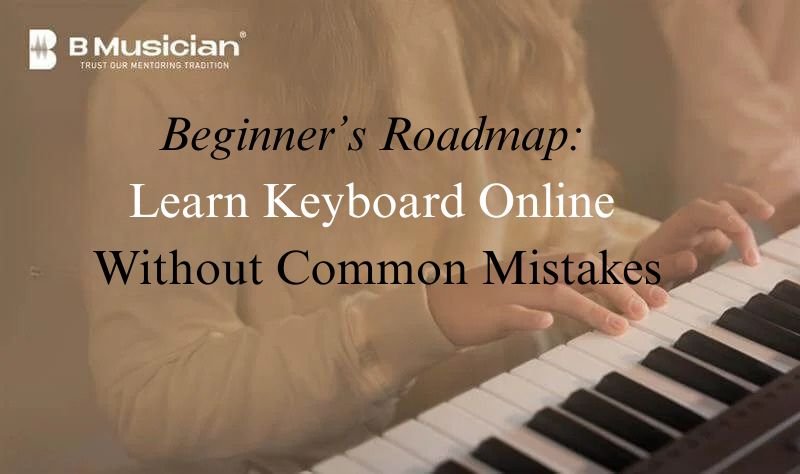Getting on with keyboards can be most rewarding. But guess what, you can convert this passion into a full-time career with us. For beginners, primarily, you can embark on this musical journey with the best online keyboard lessons that we have to offer, which will help build a solid foundation. Additionally, it will help you to avoid the common pitfalls that discourage many new learners. Our tech-enabled platform makes it easier for students to master this versatile instrument right from the comfort of their home. However, you need to follow a clear roadmap and know what mistakes to steer clear of.
Why Choose Online Keyboard Lessons as a Beginner?
The best thing about our online learning platform is that learning is flexible, affordable, and accessible to high-quality instructors from across the country. You can learn pop songs, jazz chords, or classical pieces anytime, because your course curricula will be tailored to your learning pace, attuned to your daily schedule. The best online keyboard lessons for beginners give you the structured guidance that you deserve. Additionally, interactive tools and live one-on-one support without the travel time or rigid schedules of traditional classes are bonuses.
Common Mistakes Beginners Make When Learning Keyboard Online
Even with premium resources, many beginners unknowingly develop bad habits that can hold them back long-term. When you recognize these early, you can keep your learning smooth and enjoyable.
- Skipping Proper Posture and Hand Position: The keyboard is a physical instrument, and your posture impacts your playing speed and accuracy. Slouching or poor wrist placement can limit your range and cause strain.
- Avoiding Music Theory: Many learners can readily jump straight to playing songs without prior knowledge or understanding of notes, scales, or chord progressions. But theory is critical because without it, the ultimate growth will plateau quickly.
- Not Practicing Consistently: Sporadic practice leads to slow progress. Establishing a daily or weekly routine is essential for skill retention.
- Ignoring Finger Exercises: Finger strength and agility form the basis for fluid playing. Beginners sometimes skip technical drills, making advanced pieces harder later.
- Using Non-Structured Online Content: Random YouTube videos lack the progression and feedback of structured best online keyboard lessons for beginners, leaving gaps in your learning.
Your Beginner’s Roadmap to Learning Keyboard Online Successfully
Avoiding mistakes is half the battle; the other half is following a proven roadmap designed for beginner success.
Step 1: Choose the Right Online Platform
Start by selecting a learning program explicitly geared toward beginners. Platforms like BMusician offer beginner-focused courses that combine live sessions with practice tools.
Look for:
- Step-by-step curriculum designed for zero experience.
- One-on-one instructor feedback.
- Lessons covering both technique and music theory.
- Easy-to-follow practice resources.
Step 2: Set Up Your Learning Space
Your keyboard should be placed at a comfortable height, in a well-lit space free from distractions. Investing in a bench with adjustable height will help maintain correct posture during long sessions.
Step 3: Master Basics Before Songs
It’s tempting to dive into your favorite songs right away, but foundation training matters. Focus on:
- Learning note names and positions.
- Practicing scales daily.
- Understanding rhythm and time signatures.
This is why the best online keyboard lessons for beginners emphasize scales, chords, and sight-reading before performance pieces.
Step 4: Practice Consistently
Block out 20–30 minutes daily for focused practice. Short, regular sessions are better than occasional marathon sessions. Many online lesson programs now include practice trackers to monitor your progress.
Step 5: Seek Feedback
Even for self-paced learners, regular feedback is critical. Attend live sessions with your instructor or participate in student forums where your recordings can be reviewed. Feedback accelerates progress and removes guesswork.
Step 6: Integrate Music Theory
Basic theory, such as chord inversions, harmony, and scale formulas, helps you play by ear and adapt to various genres. The best instructors integrate theory into your playing exercises so it feels practical, not abstract.
Step 7: Expand Your Repertoire Gradually
Begin with simple melodies before trying complex arrangements. Each success builds confidence and prepares you for more advanced pieces.
Benefits of Choosing the Best Online Keyboard Lessons for Beginners
Your choice of program will make or break your experience. With the right platform:
- You receive guided progression from basics to intermediate skills.
- Mistakes are corrected early before they become habits.
- Practice becomes fun thanks to interactive elements.
- You’re motivated by visible progress charts and milestone achievements.
A tailored beginner program like those offered by BMusician ensures you’re never left guessing what to do next.
How to Stay Motivated During Your Learning Journey
Motivation often dips after the first few months, especially if you practice alone. Here’s how to keep your enthusiasm high:
- Set clear goals. For example, play three songs flawlessly within three months.
- Join online communities. Connecting with fellow learners in the USA can inspire you to keep going.
- Record your progress. Comparing early recordings to newer ones shows tangible improvement.
- Reward yourself. Completing milestones deserves recognition, maybe even a new songbook or keyboard accessory.
Tools and Resources That Help Beginners Excel
Modern online lessons combine multiple tools to help you succeed:
- Digital sheet music for beginner-friendly songs.
- Slow playback options to help with challenging parts.
- Video tutorials paired with live demonstrations.
- Apps that offer keyboard simulations for theory practice.
Using these tools alongside structured best online keyboard lessons for beginners ensures steady skill development.
Mistakes to Avoid Long-Term
Even as you progress from beginner to intermediate, some habits can hinder future growth:
- Continuing without proper fingering patterns.
- Playing exclusively by memory instead of sight-reading.
- Neglecting ear training.
- Sticking to only one genre of music.
By addressing these early through a roadmap approach, your learning remains balanced and adaptable.
Final Thoughts
Your beginner’s journey to learning the keyboard online can be smooth and rewarding if approached with a plan. By choosing the best online keyboard lessons for beginners, setting clear goals, and avoiding common mistakes, you lay the foundation for lifelong musical skills. Whether your dream is to play at family gatherings, perform in a band, or enjoy music for yourself, this roadmap ensures you get there efficiently, without frustrations that make many people quit.
You can start your musical journey with a trusted platform like BMusician, where beginner-focused lessons guide you step by step toward playing confidently and musically.
Frequently Asked Questions:
What makes online keyboard lessons ideal for beginners?
Online keyboard lessons offer structured, step-by-step guidance that helps beginners learn at their own pace. With video tutorials, interactive exercises, and flexible schedules, students can practice anytime and anywhere. Many platforms also provide personalized feedback, making it easier to master fundamentals without the pressure of in-person classes.
How do I choose the best online keyboard lessons?
To choose the best online keyboard lessons, look for platforms offering beginner-friendly curriculum, clear instructions, and experienced instructors. Check for video quality, downloadable practice materials, and interactive elements. Reviews and trial lessons can help you determine if the teaching style matches your needs before committing.
Can I learn the keyboard online without prior music experience?
Absolutely. Beginner online keyboard lessons are designed for learners with no prior musical background. They start with the basics, finger positioning, note reading, and rhythm, before progressing to simple songs. Interactive exercises and gradual skill-building make it easy for complete beginners to gain confidence while learning.
How long does it take to play songs on the keyboard?
With consistent practice, most beginners can play simple songs within 1 to 3 months. Progress depends on lesson frequency, practice habits, and dedication. Online lessons often provide quick-win exercises so learners can start playing recognizable tunes early, keeping motivation high throughout the journey.


















